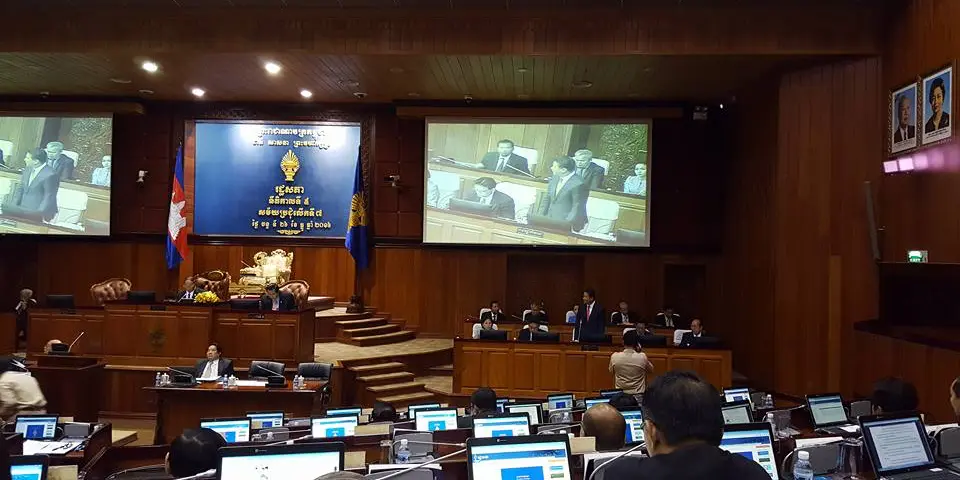
ASEAN MPs sound the alarm over proposed amendments to Cambodian Constitution and Criminal Code
February 14, 2018

JAKARTA – Parliamentarians from across Southeast Asia today expressed alarm over proposed changes to Cambodia’s Constitution and Criminal Code, and urged the National Assembly to reject the amendments when they come before the chamber this week.
ASEAN Parliamentarians for Human Rights (APHR) said that the amendments, which were approved by the Council of Ministers on Friday, marked another worrying escalation of Cambodia’s descent into authoritarianism, following the arrest of opposition leader Kem Sokha and the dissolution of the opposition Cambodia National Rescue Party (CNRP) in September and November 2017, respectively.
“These amendments are the ultimate rebuke to the achievements of the Paris Peace Accords,” said APHR Chairperson Charles Santiago, a member of the Malaysian Parliament, referring to the 1991 agreement that brought a formal end to Cambodia’s civil war and paved the way for democratic elections in 1993. “That agreement’s vision of a democratic, rights-respecting Cambodia is moving further away by the day.”
“If passed, the amendments would inflict deep, long-lasting damage to Cambodia’s institutional framework, further eroding the rule of law and entrenching the authoritarian system that has crystalized since the dissolution of the CNRP,” he added.
Parliamentarians expressed particular concern over proposed changes to the Constitution’s Article 42, which would insert a requirement for political parties to “place the country and nation’s interests first,” as well as to Article 49, which would forbid individuals from “undermining the country’s interest.”
“The proposed amendments to Articles 42 and 49 would severely undermine freedom of association in Cambodia, giving the authorities additional grounds to arbitrarily go after political parties and other groups. Their exceedingly vague wording leaves them wide open to the kind of abuse that has run rampant in recent years,” said Tom Villarin, a member of the Philippine House of Representatives.
Parliamentarians said that the proposed amendment of Article 53 to specifically declare that Cambodia “opposes any foreign interference in its internal affairs” was little more than a weak attempt at shielding the government from criticism.
“Since the start of his latest crackdown, Prime Minister Hun Sen has thrown around the term ‘non-interference’ as a blanket deflection of any criticism of his regime and its policies. But the international community, and especially ASEAN neighbors, should see through that. Claiming ‘non-interference’ doesn’t give you free reign to violate human rights and deny your people a genuine choice at the ballot box,” Villarin said.
Beyond constitutional changes, parliamentarians also expressed concern over the proposed addition of the crime of lèse majesté, or insulting the monarch, to the existing Criminal Code.
“The inclusion of lèse majesté as a crime in Cambodian law is extremely worrying. We’ve seen how this type of statute has been abused in neighboring Thailand for years, and particularly given Cambodia’s weak rule of law and consistent misuse of other statutes, we see even more serious potential for its abuse in Cambodia,” said Charles Santiago.
MPs argued that any significant legislative changes, especially attempts to amend the Constitution with proposals that could significantly impact basic freedoms, demand scrutiny and transparency, both of which have been absent from the process thus far. They also noted that the redistribution of National Assembly seats following the dissolution of the CNRP renders the chamber fundamentally undemocratic and unable to make such changes in line with existing constitutional requirements.
“Amending a country’s constitution should never be undertaken in such a rushed and secretive manner. It is a process that requires the utmost transparency and proper consultation with all stakeholders. It appears, however, that the current government is eager to push these amendments through without any consideration for due process,” Santiago said.
“This is striking evidence of the dangers of the de facto one-party system that has taken hold in Cambodia. Without a credible opposition, the popular will is cast aside and the interests of the privileged few in power are all that matters,” he added.
ASEAN Parliamentarians for Human Rights (APHR) was founded in June 2013 with the objective of promoting democracy and human rights across Southeast Asia. Our founding members include many of the region's most progressive Members of Parliament (MPs), with a proven track record of human rights advocacy work.